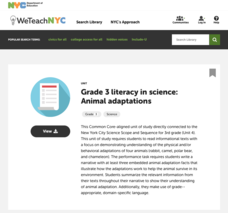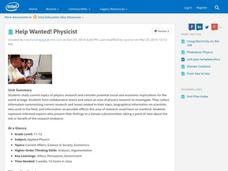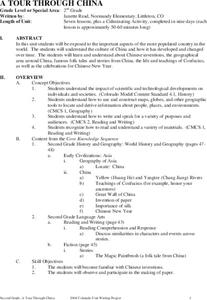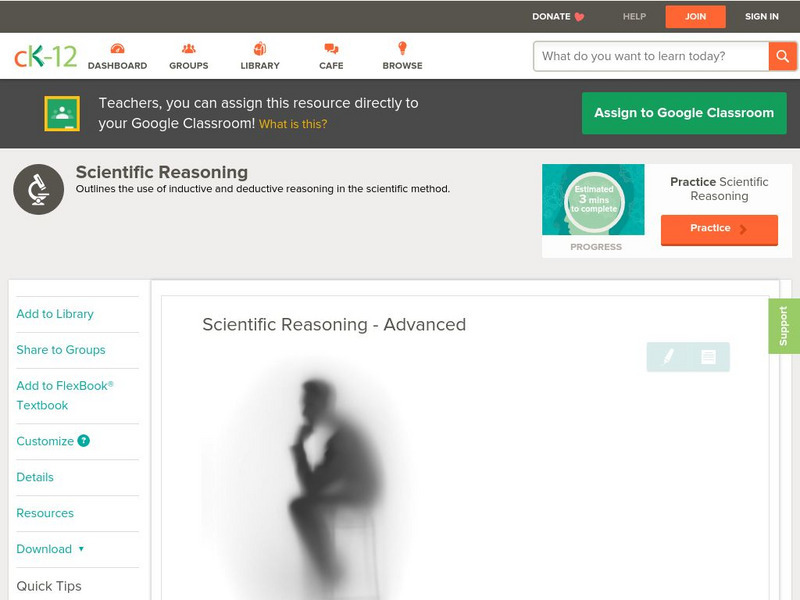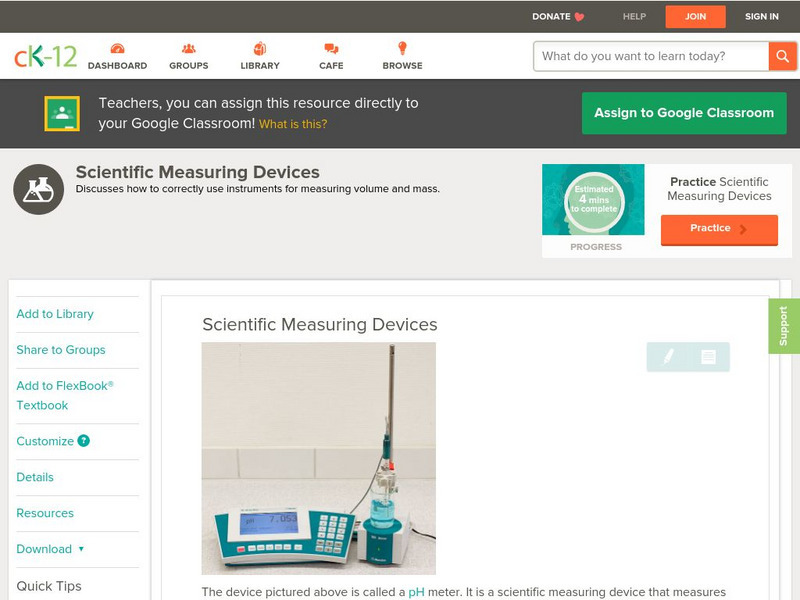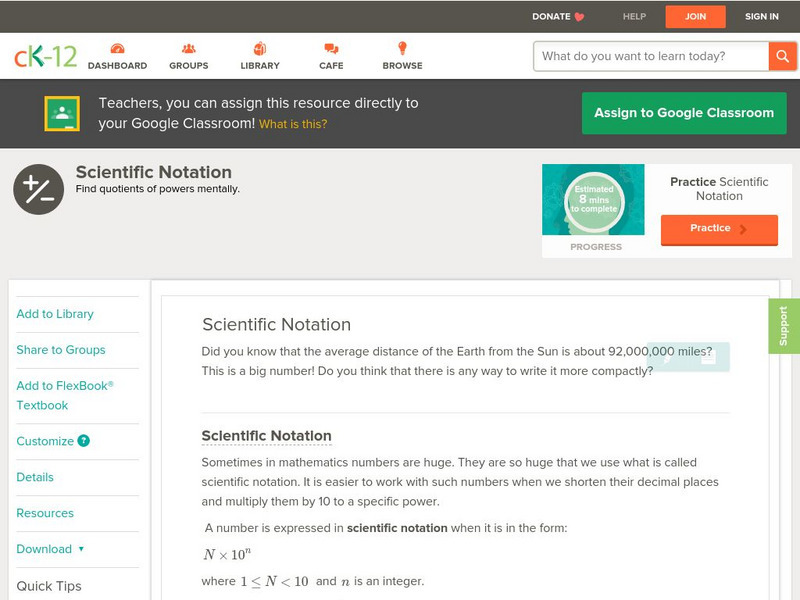Intel
Forensics: Get a Clue
Although the methods are all scientific, forensic science was started by police officers rather than scientists, who relied on observation and common sense. Young detectives use many tools to solve crimes around the school in a...
New York City Department of Education
Straw Rockets
Scholars become rocket scientists as they take off on a journey exploring Newton's laws of motion. After learning the laws of motion, pupils design their own investigations using straw rockets. They highlight their literacy skills in a...
Curated OER
The Psychology Teacher's Resource Guide
The activities in a comprehensive teacher's resource guide provides budding psychologists with opportunities to design experiments to study behavior, apply their knowledge of research variables, critique online behavior surveys, and much...
Columbus City Schools
Cell-abrate!
Lights, camera, action! With the cell at center stage, guide your seventh grade biologists through the tiny drama that plays out within every living thing. Then, enjoy the show as they portray the organelles they've studied—a performance...
Colorado Unit Writing Project
Simple Machines
Planning an elementary science unit has never been simpler! These twelve lessons guide young scientists through an exploration of simple machines and their many uses in the real world before asking them to apply their learning...
Intel
Insects: The Good, The Bad, The Ugly
What would the world be like with no insects? Ponder this question using a research-based STEM unit that encourages scholars to investigate insects from both a beneficial and hazardous perspective. They learn about insect behaviors,...
New York City Department of Education
Grade 3 Literacy in Science: Animal Adaptations
Third graders research and study animal adaptations and then use their findings to write narratives that include scientific criterion. This lesson is all about literacy and science! The lesson is completely designed for addressing Common...
Intel
Starquest
Almost every ancient culture observed the stars and saw pictures in the patterns. Studying stars allowed them to guide travelers, determine when to plant crops, when to harvest food, and the stories surrounding the images include some of...
Intel
Help Wanted! Physicist
Groups discover physics as they take an assigned scenario, perform research about different aspects of the subject matter, and present their findings to the class. From the presentations, learners must develop and support a point of view...
Intel
Lights, Camera, Reaction!
Excite classes with a STEM project-based learning lesson covering chemical reactions. Groups study the different types through simulations and hands-on activities. They pick one type (synthesis, decomposition, single displacement, double...
Columbus City Schools
Making Waves
Learning about waves can have its ups and downs, but a demo-packed tool kit has the class "standing" for more! Learners gain experience with several different wave types, organizing observations and data, and wave...
Intel
Energy Innovations
Collaborative groups examine the importance of energy resources on quality of life by researching different energy sources and alternative energy sources through data analysis. They make a comparison of different countries and cultures,...
Intel
What Does This Graph Tell You?
What can math say about natural phenomena? The fifth STEM lesson in this project-based learning series asks collaborative groups to choose a phenomenon of interest and design an experiment to simulate the phenomenon. After collecting...
Curated OER
A Tour Through China
Students explore the culture, development, inventions, and geography of China in the seven lessons of this unit. The teachings of Confucius are examined and the celebrations for the Chinese New Year are inspected.
Curated OER
Land of the Rising Sun
Students survey aspects of traditional and modern Japanese customs and beliefs in the seven lessons of this unit. Both the culture and the geography of the country are studied in this unit.
Other
Science4 Us: Science Tools
The Tools module introduces students to the tools scientists use for both qualitative and quantitative observations. Students learn to use tools such as their senses, rulers, and balance scales through hands-on activities.
CK-12 Foundation
Ck 12: Algebra: Operations With Numbers in Scientific Notation
[Free Registration/Login may be required to access all resource tools.] In this lesson students use scientific notation to find sums, differences, quotients and products of numbers. Students examine guided notes, review guided practice,...
CK-12 Foundation
Ck 12: Scientific Thinking: Scientific Reasoning Advanced
[Free Registration/Login may be required to access all resource tools.] Find out about how people use scientific reasoning to think scientifically. Included in the assignment is a four minute video and review questions.
CK-12 Foundation
Ck 12: Physical Science: Scientific Measuring Devices
[Free Registration/Login may be required to access all resource tools.] How to use scientific measuring devices (metric ruler, triple beam balance, graduated cylinder).
CK-12 Foundation
Ck 12: Physical Science: Scientific Measuring Devices
[Free Registration/Login may be required to access all resource tools.] How to use scientific measuring devices (metric ruler, triple beam balance, graduated cylinder).
CK-12 Foundation
Ck 12: Algebra: Scientific Notation
[Free Registration/Login may be required to access all resource tools.] Express large and small numbers using scientific notation.
CK-12 Foundation
Ck 12: Life Science: Scientific Investigation
[Free Registration/Login may be required to access all resource tools.] The scientific method is a process used to investigate the unknown. It is the general process of a scientific investigation. This process uses evidence and testing....
CK-12 Foundation
Ck 12: Algebra: Scientific Notation
[Free Registration/Login may be required to access all resource tools.] Scientific notation, why it is used, and converting numbers to and from scientific notation.
CK-12 Foundation
Ck 12: Scientific Method
[Free Registration/Login may be required to access all resource tools.] Describe how the Renaissance period in history changed the approach to science. Identify the steps of the scientific method. Differentiate between the independent...






